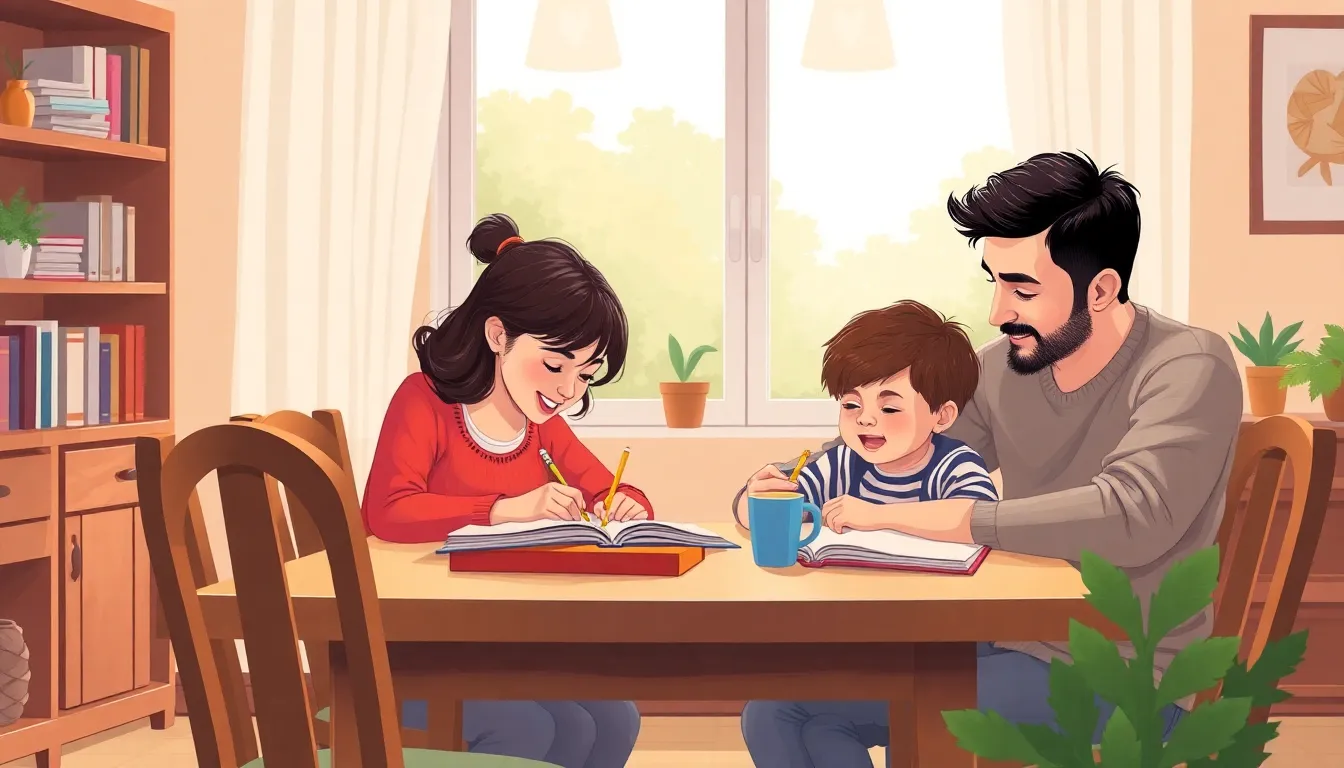When it comes to parenting styles, authoritative parenting often gets a gold star. But before parents start polishing their trophies, it’s time to take a closer look at the not-so-glamorous side. Sure, this approach emphasizes structure and support, but it can also lead to some unexpected consequences that might leave parents scratching their heads—or pulling their hair out.
Imagine a household where rules reign supreme, and every misstep is met with a stern gaze. While parents might think they’re fostering responsibility, kids can end up feeling stifled, rebellious, or even anxious. Dive into the world of authoritative parenting, and discover the not-so-rosy realities that could turn the family dinner into a battlefield of wills. It’s time to explore why sometimes, a little less authority might just lead to a lot more harmony.
Table of Contents
ToggleOverview of Authoritative Parenting
Authoritative parenting represents a structured approach that combines expectations with emotional support. This style provides clear guidelines while promoting open communication between parents and children. Parents using this method typically encourage independence, fostering self-discipline and responsibility.
While many view authoritative parenting positively, it carries notable downsides. Children often experience a strong sense of pressure due to strict rules and high expectations. Sometimes, this pressure leads to feelings of rebellion or anxiety, as they struggle to meet parental standards. Conflicts may arise within families, particularly when children push back against authority figures.
Families may find that the quest for balance becomes challenging. Authoritative parents aim to guide effectively, but this can inadvertently stifle a child’s ability to express themselves freely. Expectations might overshadow the opportunities for children to explore their interests. As a result, emotional burdens can accumulate, negatively affecting mental well-being.
Research has shown varied outcomes for children raised under this style. While many develop strong social skills and self-control, others may struggle with anxiety or self-esteem issues. A focus on conformity might limit their creativity and self-discovery.
Understanding these complexities helps parents navigate their roles better. Acknowledging both the strengths and weaknesses of authoritative parenting leads to healthier family dynamics. It becomes crucial to find a balance that nurtures independence while maintaining a supportive environment. This awareness enhances the overall family experience, promoting understanding and cooperation.
Common Characteristics

Authoritative parenting embodies several characteristics that shape child development. These traits can carry both positive and negative implications for children.
High Expectations
Expectations in authoritative parenting often stand out as particularly high. Parents typically set ambitious standards for academic performance and behavior. Children may feel pressured to meet these expectations consistently. This pressure may foster motivation in some, while leading to anxiety in others. Striving for perfection can result in fear of failure among children. Increased stress levels may occur, especially when they struggle to achieve set goals. Balancing these high expectations with support is crucial for maintaining a healthy environment.
Emotional Responsiveness
Emotional responsiveness is a hallmark of authoritative parenting. Parents generally provide warmth and encouragement, fostering a nurturing atmosphere. Children often feel valued and understood, contributing positively to their emotional well-being. However, excess emotional involvement might lead to challenges, as some children may depend heavily on validation. This reliance can stifle independence and self-reliance over time. Emphasizing emotional support while encouraging autonomy promotes a balanced dynamic between caring and independence.
Cons of Authoritative Parenting
Authoritative parenting, while often seen as balanced, has notable downsides that can impact children significantly.
Potential for Over-Control
Over-control emerges when parents set rigid rules that limit children’s autonomy. Children may feel constrained by excessive direction, leading to feelings of frustration. Strict limitations can foster a rebellious attitude, where kids push back against authority. The potential for anxiety increases as children navigate constant pressure to conform. Parents often expect adherence to high standards, which may overshadow individual preferences and personal growth. Moreover, when they micromanage, it can inhibit problem-solving skills, making children less equipped to handle challenges independently.
Impact on Child Independence
Independence suffers when parents excessively scaffold their children’s experiences. Children may struggle with self-reliance due to continuous guidance and support. Opportunities to explore personal interests often diminish, leaving kids reliant on their parent’s preferences. Some children might develop low self-esteem if they consistently seek approval for their choices. Additionally, emotional dependency may arise, creating challenges in peer relationships as they frequently look to parents for affirmation. The focus on obedience rather than personal initiative can hinder their ability to express themselves freely.
Comparison with Other Parenting Styles
Comparing authoritative parenting to other styles highlights important distinctions that affect child development. Each style presents unique implications.
Authoritative vs. Authoritarian
Authoritative parenting differs significantly from authoritarian parenting. While authoritative parents set clear expectations and provide support, authoritarian parents prioritize obedience without room for flexibility. Authoritative parents encourage independence alongside their guidelines, fostering open communication. In contrast, authoritarian parents often limit discussion, leading to feelings of fear and resentment in children. Children raised by authoritative parents typically exhibit better self-esteem and social skills. Authoritarian parenting can create challenges, such as increased anxiety and lower self-worth due to harsh discipline and lack of emotional support.
Authoritative vs. Permissive
Authoritative parenting shows a balanced approach compared to permissive parenting. Authoritative parents maintain structure and enforce rules while also being responsive and nurturing. Permissive parents, however, prioritize freedom and often avoid imposing limits, which can result in children lacking self-discipline. With authoritative parenting, children learn to navigate boundaries while developing their individual identities. Permissive parenting can lead to issues with self-regulation, as children may struggle with authority and responsibility. This comparison illustrates how authoritative parenting promotes both autonomy and accountability, fostering well-rounded individuals.
Authoritative parenting presents a complex landscape for families. While it aims to balance structure and emotional support, the potential drawbacks cannot be overlooked. Children may feel overwhelmed by high expectations and rigid rules, leading to anxiety and a struggle for independence. This pressure can stifle creativity and self-expression, creating conflicts within the family dynamic. Striking the right balance between guidance and autonomy is essential for fostering healthy development. Understanding these nuances allows parents to adapt their approach, ensuring they nurture their children’s individuality while providing the necessary support to thrive.








